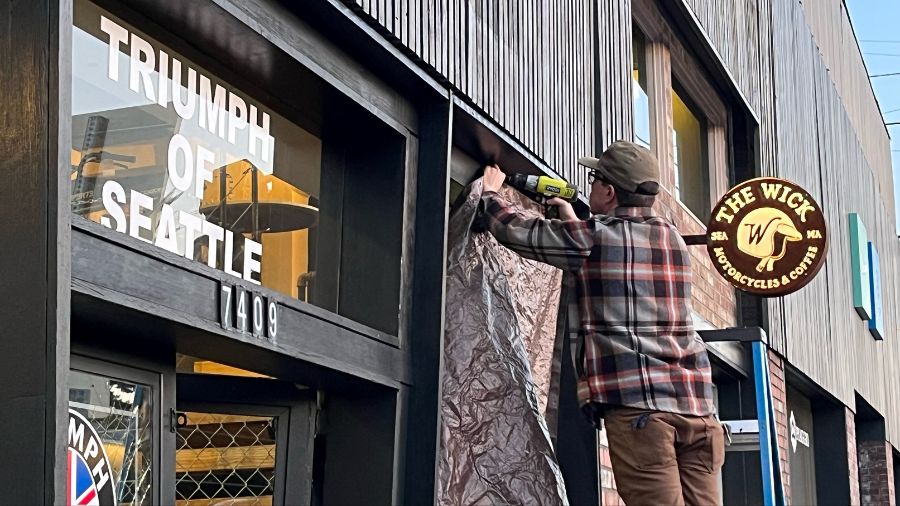If it wasn’t for the Racoon, we might all be British
Nov 14, 2013, 4:05 PM | Updated: Nov 15, 2013, 4:53 pm

Feliks Banel grew up believing that oldest and most meaningful American history had happened far away from Seattle, in New England and the mid-Atlantic states. Even the tales of Lewis and Clark paled in comparison. (AP)
(AP)
As we observe Veterans’ Day this week, the 150th anniversary of the Gettysburg Address later this month, and the centenary of World War One next year, an important and largely forgotten bicentennial is already underway right here at home.
Many of us, who were kids four decades ago, have fond memories of the celebration of the American Bicentennial back in 1976. In the years leading up to July 4th of that year, all of America celebrated 200 years of freedom from tyranny, with lush commemorative postage stamps featuring Revolutionary War battles and heroes, road signs designating our towns as “Bicentennial Communities,” special curriculum and programs in public schools, and short video vignettes called “Bicentennial Minutes” that ran each night on CBS TV.
Because of the duration and intensity of that Bicentennial celebration, I grew up believing that oldest and most meaningful American history had happened far away from Seattle, in New England and the mid-Atlantic states. Even the tales of Lewis and Clark reaching the Pacific Northwest some 25 years after the Revolution pale in comparison to the romanticized version of events in the efforts of the 13 colonies to throw of the British. It was as if on the one hand, you had Tea Partying colonists and Minute Men chafing at their imperialist shackles and proclaiming “Give me liberty or give me death!” And then on the other, you had a bunch of guys dressed in buckskins who went on a long camping trip out West with Uncle Sam picking up the check.
So it was with a sense of delight that I recently made my own personal discovery of what’s now one of my favorite stories of Pacific Northwest history. And though you wouldn’t know it, we are right in the midst of the 200th anniversary of one of the most pivotal moments in our region’s history: the British takeover of what’s now Astoria, Oregon during the War of 1812.
A group of Americans had landed at the mouth of the Columbia River in 1811. They were known as the Pacific Fur Company and they were backed by wealthy New York businessman John Jacob Astor. Their intention was to establish a post for gathering and exporting lucrative animal furs.
At that time, there was no formal government in the Pacific Northwest, only the Natives who’d been here for thousands of years, along with more recent European arrivals. The area encompassing what’s now Washington, Oregon, Idaho and parts of Montana, Wyoming and British Columbia was generally known as “The Oregon Country.” But there were already significant British interests here in the form of the North West Company – mostly on the north side of the Columbia River in what’s now Washington – who were also in the fur business.
Astor’s men weren’t that successful in the fur trade and Astoria struggled. In the autumn of 1813, when Astor’s men heard that Britain and the United States were at war, and learned that His Majesty’s Navy was likely on its way to forcibly claim Astoria, they decided to take pre-emptive action. In late October 1813, the Americans struck a deal with their British counterparts across the river and sold Astor’s Pacific Fur Company assets to the North West Company.
When the British sloop-of-war Racoon finally did arrive in early December 1813, the captain was disappointed to learn that there would be no battle and no heroic victory. But, he insisted on formally taking possession of the old American settlement anyway, even though it had already changed hands in a business transaction. The triumphant crew ceremoniously hoisted a Union Jack over Astoria and re-christened the war booty as Fort George, in honor of their monarch.
This decision by the Racoon to formally take Astoria would come back to bite the British. According to historian Frederick Merk, it was this act that opened the door for another formal action when the War of 1812 was over and the British and Americans had reached a peace settlement via the Treaty of Ghent. The treaty called for all American territory captured by the British to be returned. Thus, the post-war question of Astoria, which had existed as a business enterprise in the political vacuum that was early Oregon Country, inadvertently helped give legitimacy to American territorial claims to what was then the most strategic piece of land in the region – the mouth of the Columbia River.
The British and Americans would ultimately agree to jointly occupy Oregon Country for nearly 40 years before the boundary between the U.S. and what’s now Canada, would be settled on the 49th parallel and the U.S. territory of Oregon would be created. So, were it not for the actions taken by the crew of the Racoon, we might very well be celebrating the “British Oregon Bicentennial” this autumn with a cheery greeting of “God Save the Queen” to our fellow royal subjects.













